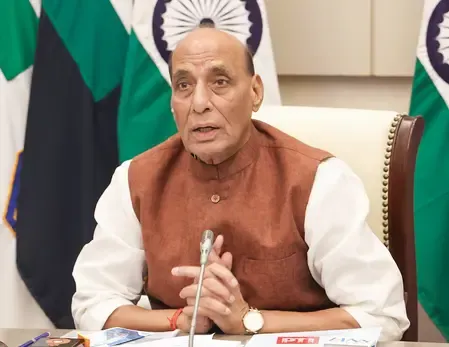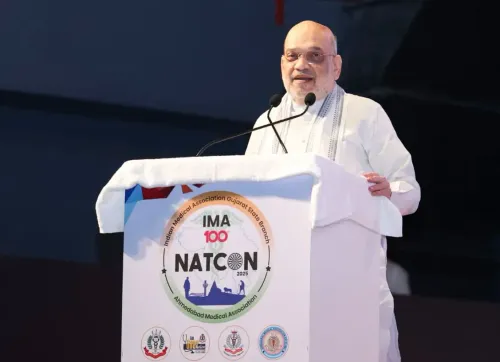Has Rajnath Singh Approved the Defence Procurement Manual 2025?

Synopsis
Key Takeaways
- DPM 2025 aims to streamline procurement processes for the Armed Forces.
- Focus on self-reliance and innovation in defence manufacturing.
- Encourages participation of private players and MSMEs.
- Reduces Liquidity Damages during development phases.
- Empowers Competent Financial Authorities for quicker decision-making.
New Delhi, Sep 14 (NationPress) - Defence Minister Rajnath Singh has given the green light to the Defence Procurement Manual (DPM) 2025, aimed at enhancing, simplifying, and streamlining the revenue procurement processes to meet the evolving needs of the Armed Forces, an official announced on Sunday.
The updated manual is designed to promote self-reliance in addressing the demands of the Armed Forces under the Revenue Head (Operations and Sustenance Segment), the official mentioned in a statement.
The DPM 2025 will encourage collaboration among the three Services and ensure optimal military readiness through quicker decision-making. This will guarantee the timely provision of necessary resources to the Armed Forces at a fair cost.
The document further strengthens the ease of doing business and aims to enhance Aatmanirbharta in defence manufacturing and technology, according to the official statement.
The goal is to leverage the potential, skills, and resources of the domestic market in the defence sector by ensuring the active engagement of private entities, MSMEs, start-ups, alongside established Defence Public Sector Undertakings (DPSUs), the statement added.
The procurement of goods and services by Defence Services and other organizations under the Ministry of Defence is governed by the DPM, which was last revised in 2009. This manual has undergone revision in consultation with the Armed Forces and other stakeholders.
The DPM outlines the guiding principles and provisions for all revenue procurements within the Ministry, valued at approximately Rs 1 lakh crore for the current Financial Year.
The revised document aligns with the updated provisions of the Manual for Procurement of Goods issued by the Ministry of Finance. As a significant push for Aatmanirbhar Bharat, a new chapter has been added to promote self-reliance through innovation and indigenisation.
This initiative will facilitate the indigenisation of defence items and spares through in-house design and development in partnership with public/private industries, academia, IITs, IISc, and other esteemed private institutions, utilizing the talents of young innovators, the statement indicated.
Concerns of individuals and industries wishing to enter this sector have been addressed by relaxing several provisions of development contracts. A new provision has been introduced to avoid levying Liquidity Damages (LD) during the development phase. A minimal LD of 0.1 percent will be applied after the prototype development, while the maximum LD has been reduced to 5 percent. In cases of excessive delays, the maximum LD will only reach 10 percent. This approach will incentivize suppliers who strive to meet deadlines while delivering supplies with slight delays, the statement added.
Moreover, a provision guarantees an assured quantity of orders for up to five years, extendable by another five years in exceptional circumstances. Another provision aims to provide necessary support through assistance from the Services in sharing technical know-how, existing equipment, and more to ensure successful development.
The revised document will empower Competent Financial Authorities at lower levels, speeding up decision-making, minimizing file movement between levels, and ensuring timely payments to suppliers. CFAs now have the authority to decide on extending delivery periods, regardless of delay duration, without needing to consult higher authorities.
The concept of collegiate decision-making has been further reinforced, aligning with current practices in the acquisition of capital assets. CFAs now have the authority to extend bid opening dates within a specified limit if participation is low, without needing to consult their Financial Advisors.
Given the complexities of repair, refit, and maintenance of various aerial and naval platforms, an upfront provision of 15 percent growth in work has been extended to all such activities to reduce equipment downtime and ensure availability for operations with minimal delays, the statement noted.
For specialized goods available from limited sources, the new provisions allow for Limited Tendering for values up to Rs 50 lakh and beyond in exceptional circumstances. For proprietary items, procurement on a Propriety Article Certificate basis is permitted, provided parallel efforts are made to explore the market for alternative sources.










